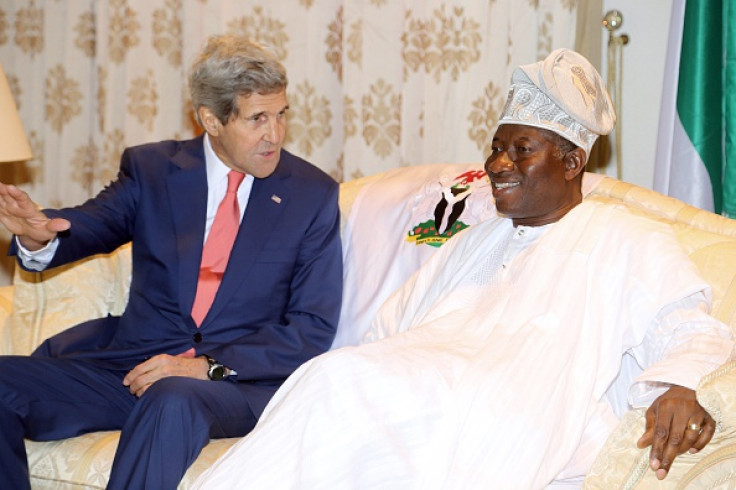Boko Haram: President Jonathan and John Kerry renew vow to end insurgence

Nigerian President Goodluck Jonathan has met US Secretary of State John Kerry to renew their commitment to end the bloody insurgence of terror group Boko Haram.
"We are together engaged in a struggle against a common enemy that promotes terror, fear, division, and violates human rights, most especially of women and girls, with complete impunity," Jonathan said in a statement as US Secretary John Kerry visited the country at the weekend.
The announcement came shortly after the militants engaged in violent fighting with troops in the town of Maiduguri, capital of Borno state, putting hundreds of civilians "at grave risk".
"Winning the fight against Boko Haram in Nigeria and West Africa is absolutely essential to beat back the tide of religious extremism around the world," the president continued.
Who are Boko Haram militants?
Boko Haram, which fights against Western influence in Nigeria and aims to impose its version of sharia law in the country, declared an Islamic caliphate in Gwoza, along the Cameroon border, in August 2014.
The group has been raiding several cities in the north of the country in a bid to take control of more land.
Three states, Adamawa, Borno and Yobe, have been under a state of emergency since May 2013, due to Boko Haram's deadly attacks.
"Our security forces have been working tirelessly and courageously to achieve this goal. I reaffirmed for Secretary Kerry that Nigeria is strongly committed to building the multinational task force to fight Boko Haram.
"I am deeply committed to ensuring that our forthcoming election is free, fair, and credible. It is especially critical that all political parties abide by the Abuja Accord, which commits each to non-violence before, during, and after the election," Jonathan said.
The Nigerian President has been accused several times of not doing enough to halt Boko Haram's violence, which has resulted in the death of thousands.
The parents of some 220 girls, kidnapped by the insurgents in Chibok, Borno, last April, strongly criticised the government for its lack of efforts to find the girls and hold the terrorists accountable.
Reports also emerged that Nigerian troops refuse to be deployed in areas controlled by Boko Haram claiming they are not adequately equipped to fight the insurgents.
Last October, local media reported that some soldiers allegedly injured themselves to avoid deployment in areas controlled by the insurgents after clashes had caused the deaths of hundreds of troops.
The Nigerian government's ability to counterfeit terrorism in the country has further lost credibility after it announced last October that a ceasefire deal had been reached with Boko Haram members.
Experts cast doubt over the validity of the truce, as it was not confirmed by Boko Haram's leader Abubakar Shekau.
Shortly after, Shekau released a video in which he called the claims "lies".
Some have also argued that there are people behind Boko Haram who fund the group to put pressure on Jonathan, who is re-running for president in the upcoming February election, to step down.
At the beginning of January, Boko Haram slaughtered at least 2,000 people, including women and children, in Borno state.
The mass-killing, described as "possibly the deadliest" the terrorists have committed, was carried out as the group raided 16 towns in Borno.
It is estimated that at least 1.6 million Nigerians have fled their homes since the group's insurgence started in 2009.
© Copyright IBTimes 2024. All rights reserved.






